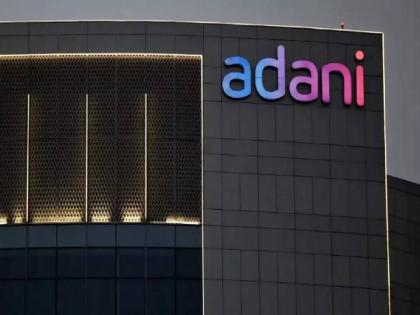Financial Times report against Adani Group is just for noise: Cantor Fitzgerald
By ANI | Published: May 23, 2024 05:36 PM2024-05-23T17:36:53+5:302024-05-23T17:40:07+5:30
New Delhi [India], May 23 : The latest Financial Times report that targeted Indian conglomerate Adani Group Article was ...

Financial Times report against Adani Group is just for noise: Cantor Fitzgerald
New Delhi [India], May 23 : The latest Financial Times report that targeted Indian conglomerate Adani Group Article was just for noise, noted global financial services firm Cantor Fitzgerald, asserting that the financial market appeared to have shrugged off the said report.
The financial advisory firm's report said that the market is inferring that the media article against the conglomerate was an "immaterial story."
Adani Enterprises shares closed 8.2 per cent higher on Thursday at Rs 3,398.20. Adani Group's market capitalization continued to gain for the tenth consecutive day.
On Wednesday, London-based Financial Times, citing documents from George Soros-backed Organized Crime and Corruption Reporting Project (OCCRP), in a report, charged the Adani group of fraud and selling low-grade coal as high-value fuel in the year back in 2013 to Tamil Nadu Generation and Distribution Company.
The consistent rise in the group's market capitalisation over the past year shows that despite allegations, investors have reposed faith in the Adani group companies.
This is the third time that two foreign media platforms have published negative reports on the group. The Adani group denied all allegations and questioned the timing of the latest report when general elections are going on in the country.
The Financial Times published an article on the Adani Group, alleging that in 2013, the Adani Group imported low-quality coal and then sold that same coal to state-owned entities, but priced it as high-grade coal.
When Cantor Fitzgerald reached out to Adani Group, the conglomerate noted that this specific purchase order to a Tamil Nadu company was a fixed-price contract, which the company won through an open, competitive, and global bidding process.
Adani Group, according to Cantor, was contractually obliged to supply coal to the Tamil Nadu company at a predetermined price.
"The supplier under this tender (Adani) could supply coal that had a gross calorific value (GCV) between 5,800 and 6,700. If the supplier supplied coal with a lesser GCV, it would face a penalty taken out from the pre-determined payment amount," said Cantor report.
Cantor claimed that the conglomerate told them that the quality of the coal was tested not by the supplier Adani Group, but by the receiver.
"The payment is then based on these findings. Thus, the assertion that Adani could buy lower GCV coal and sell it as higher GCV coal appears to not be plausible given testing is done by the buyer and payment is based on testing," it added.
According to Cantor, Adani Group further noted that the coal it delivered was within 100 GCV points, and therefore, considered permissible for full payment.
Interestingly, the cantor report pointed out that the FT report was based on customs and Directorate of Revenue Intelligence (DRI) reports.
"It is worth noting that, during the alleged time period (2012-2014), DRI and customs accused all coal importers of mis-declaring the quality of coal to be lower than it actually was. As a result, they wanted additional customs duties. So the fact that this report argues against what DRI/customs was saying back then also raises a red flag, in our view."
Further, stating that India is one of the fastest-growing economies and is heavily investing across the board, Cantor believes it bodes well for Adani Enterprises.
Last year, an American short seller Hindenburg Group launched an attack on Adani Group in January this year through a report that allegedly claimed accounting fraud, stock price manipulation and improper use of tax havens.
Post the Hindenburg report, the group had erased close to USD 150 billion in its market value. Adani Group has been denying all allegations since the beginning of the controversy.
The Adani Group had then attacked Hindenburg as "an unethical short seller", stating that the report by the New York-based entity was "nothing but a lie". A short-seller in the securities market books gains from the subsequent reduction in the prices of shares.
Disclaimer: This post has been auto-published from an agency feed without any modifications to the text and has not been reviewed by an editor
Open in app